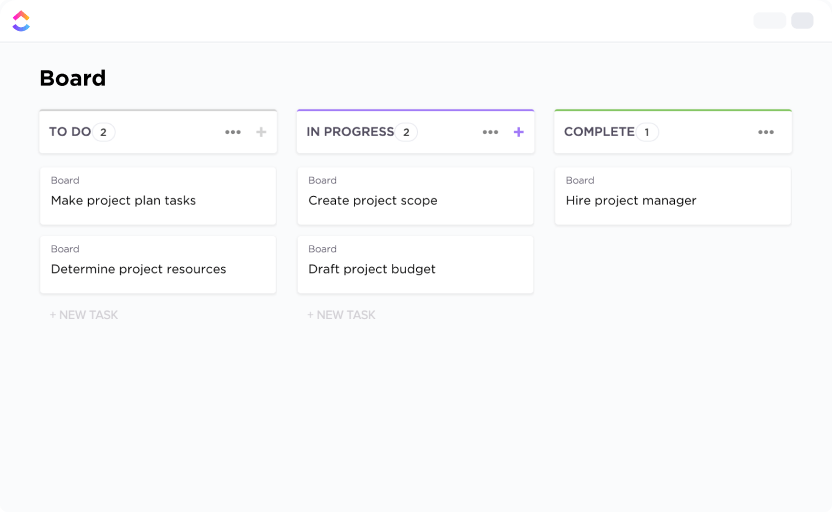Jane was this close to losing it. Her desktop had 47 open tabs, her team was asking for updates she couldn’t remember assigning, and her “project timeline” lived on a whiteboard someone had accidentally erased.
As a project manager, Jane was great at putting out fires—but lately, she felt more like a full-time firefighter than a leader. Then came her “Kanban awakening.”
If you’ve, too, felt like your workflow is a wild jungle and you’re the lone explorer with a broken map, this blog is for you.
We’re diving into free Asana Kanban templates—super helpful for project managers, agile teams, and anyone practicing agile project management who likes their tasks where they can see them.
🧠 Fun Fact: Kanban comes from two Japanese words: 看 (Kan) meaning ‘sign’ and 板 (Ban) meaning ‘board.’ The name says it all. Kanban boards simplify work management by making tasks visible, whether they’re stuck in review, waiting for approvals, or nearing completion.
Free Asana Kanban Templates to Streamline Your Workflow
Kanban Templates at a Glance
Here’s a summary table for all the Kanban templates listed in the blog:
| Template Name | Template Link | Ideal For | Best Features | Visual Format |
| Asana Kanban Board Template | Download this template | Solopreneurs, lean ops teams, first-time Asana users | Simple columns, board view, duplicate/tweak tasks | Kanban Board |
| Asana Kanban Card Template | Download this template | Detail-oriented teams | Custom Fields, subtasks, dependencies, structured cards | Kanban Card |
| Asana Scrumban Template | Download this template | Agile squads, hybrid Scrum/Kanban teams | Sprint rituals, Kanban views, WIP limits, tagging | Kanban Board |
| Asana Daily StandUp Meetings Template | Download this template | Remote/hybrid teams | Async updates, blockers, follow-up actions | Kanban Board/Standup |
| Asana Sprint Backlog Template | Download this template | Agile/Scrum teams | Kanban visualization, reprioritize scope, flag blockers | Kanban Board |
| Kanban Board Template | Get free template | Project managers, agile marketers, cross-functional teams | Nested subtasks, live updates, automations | Kanban Board |
| Kanban View Roadmap Template | Get free template | Product leads, engineering managers | Custom Fields, multiple views, real-time roadmap | Kanban Board, Timeline |
| Kanban for Software Development Template | Get free template | Engineering teams, dev leads | WIP limits, auto-routing, status updates | Kanban Board |
| Agile Kanban Project Management Template | Get free template | Agile squads, tech teams | Epics, story points, WIP limits, sprint reports | Kanban Board |
| Agile Sprint Planning Template | Get free template | Scrum masters, agile PMs | Automated backlog, capacity planning, burndown charts | Kanban Board, Sprint View |
| Simple Sprints Kanban Template | Get free template | Small teams, startups | Auto-roll tasks, blockers, sprint goals | Kanban Board |
| Getting Things Done Template | Get free template | Knowledge workers, freelancers | GTD stages, context tags, effort levels | Kanban Board, List |
| Customer Onboarding Template | Get free template | Customer success teams | Dynamic checklists, automations, analytics | Kanban Board, Checklist |
| Hiring Selection Matrix Template | Get free template | HR teams, hiring managers | Scorecards, shared views, visual comparisons | Kanban Board, Matrix |
| Project Retrospective Template | Get free template | Agile teams, scrum masters | Feedback loop, async feedback, outcome tracking | Kanban Board |
| IT Support Template | Get free template | IT help desks, sysadmins | Auto-routing, color coding, SLA tracking | Kanban Board |
| Business Expense and Report Template | Get free template | Finance teams, department heads | Centralized log, auto-notifications, analytics | Kanban Board, Report |
| Blog Editorial Calendar | Get free template | Bloggers, editors, marketing teams | Stage-based tracking, asset attachments, timelines | Kanban Board, Calendar |
What Makes a Good Asana Kanban Template?
An Asana Kanban template is a pre-built board that lays out your workflow in clear, visual stages, such as ‘To Do,’ ‘In Progress,’ and ‘Done,’ so your team moves tasks forward with purpose, not confusion.
But a solid Kanban board does more than organize tasks. It reflects how your team truly works, adhering to Kanban principles such as visual project management, work-in-progress (WIP) limits, and continuous improvement.
Look for these key components in a high-performing Kanban board template:
- Visual hierarchy: Surface what matters first. Good Kanban board templates should highlight upcoming tasks, high-priority stages, or looming problems so your team knows exactly where to focus
- Clear ownership: Assign tasks and clarify the person responsible for each item. Color-coded reviewers or role-based swimlanes (e.g., ‘Dev Review’ vs. ‘Client Review’) reduce ambiguity and drive accountability
- Automation triggers: Skip repetitive steps. The best templates auto-assign teammates, trigger due dates, or send reminders the moment a card moves—perfect for agile workflows with frequent status changes and feedback loops
- Customization: Tailor as you go. Whether you’re shifting sprint goals, updating task statuses, or renaming columns, great templates flex your process, not the other way around
- Live tracking: Get a real-time pulse on progress. This instant overview lets you run async standups, keep stakeholders in the loop, and maintain visibility across fast-moving projects—all from one dashboard
- Built-in teamwork: Keep team collaboration frictionless. Use @mentions, card comments, and attachments to loop in team members, fix blockers fast, and keep all updates exactly where the work happens
💡 Pro Tip: Choose a Kanban board template with reusable tags, column logic, and built-in rules you can clone in seconds—for things like client onboarding, marketing campaigns, social media calendars, or weekly retros. One solid setup = endless repeat wins.
Free Asana Kanban Templates to Try
These plug-and-play digital Kanban tools help you lay out tasks in stages and keep team workflows visible. Each template in this list suits a specific workflow—whether it’s sprint planning, reviews, or ongoing queues.
1. Asana Kanban Board Template
If you’re new to Kanban boards in Asana, this template gives you a head start. With four simple columns—New Requests, Backlog, In Progress, and Completed—you can easily visualize individual tasks as they move across stages.
Each column represents a clear work status, so nothing slips through the never-ending list.
Here’s why you’ll like this template:
- Use the board view to spot where tasks stand across different stages instantly
- Duplicate and tweak recurring tasks without starting from scratch
- Create lightweight workflows for internal ops, hiring, or content pipelines
🔑 Ideal for: Solopreneurs, lean ops teams, or first-time Asana users who want to create a Kanban board without the complexity.
🔎 Did You Know? Kanban started in the 1940s when Toyota engineer Taiichi Ohno reinvented the manufacturing process with a just-in-time system. Instead of overproducing, teams built exactly what customers needed (right when they did). This pull-based mindset remains at the heart of agile productivity today.
2. Asana Kanban Card Template
A Kanban board is only as strong as its cards, and the Kanban Card template turns each one into a task command center. Instead of scattered task info, you get a repeatable layout with Custom Fields, subtasks, and formatting options. Open any card, and teammates instantly see what’s happening, what’s needed, and who’s on it.
Here’s why you’ll like this template:
- Break down complex work with nested subtasks and visual task hierarchies
- Add clarity with structured fields for priorities, deadlines, and owners
- Connect related work by mapping task dependencies directly on the card
🔑 Ideal for: Detail-oriented teams who need to track complex task information within their Kanban workflow.
🎥 Watch a project manager transform into Kanban man (say thank you, later!)
3. Asana Scrumban Template
If you’re moving from Scrum workflows to Kanban or blending them, this Scrumban Asana template helps you make the transition smoothly.
It provides your team with a familiar framework while transitioning to a more flexible, pull-based workflow. Visualize tasks, track progress, reprioritize as goals change, and maintain a consistent cadence without reworking your setup every time.
Here’s why you’ll like this template:
- Blend sprint rituals with Kanban views to keep structure without losing flexibility
- Automate agile routines like daily standups, WIP limits, and backlog grooming
- Tag tasks by story points or effort levels to plan smarter and flag blockers early
🔑 Ideal for: Agile squads juggling releases, bug fixes, and sprint planning—while testing Scrumban to boost flow without losing structure.
🔎 Did You Know? Scrum and Kanban are both rooted in Agile methodologies, but they guide teams in different ways.
- Scrum thrives on structure, with sprints, ceremonies, and defined roles. It’s great for teams that run on routine and time-boxed goals
- Kanban is all about flow—leveraging visual project management, limiting task overload, and adapting in real time
✨ Many teams blend the two (Scrumban)—combining Scrum’s rituals with Kanban’s flexibility for a workflow that adapts as they scale.
4. Asana Daily StandUp Meetings Template
Standups should keep your team in sync, but too often, they become a rushed list of updates. This Daily StandUp Meetings Template provides a structure for your daily check-ins, ensuring everyone knows what to share, what is blocked, and what requires follow-up.
It ensures no update gets missed, even when your team is working across time zones.
Here’s why you’ll like this template:
- Simplify daily task management with an intuitive visual interface
- Loop in team members with async updates and visible blockers
- Create follow-up actions instantly—right where the work happens
🔑 Ideal for: Remote or hybrid teams that need fast, async-friendly standups to stay aligned without adding another meeting.
5. Asana Sprint Backlog Template
Sprints move fast, and without a clear backlog, it’s easy to overcommit or overlook key work. This agile-focused template helps teams prioritize, triage, and refine sprint items using Kanban visualization.
Estimate effort, identify bottlenecks, and adjust on the fly as new blockers or bugs emerge—all without derailing delivery.
Here’s why you’ll like this template:
- Visualize work goals and task load with a clean Kanban-style layout
- Reprioritize or expand scope mid-sprint while keeping shipping timelines intact
- Flag blockers fast and keep progress visible for team members and stakeholders
🔑 Ideal for: Agile or Scrum teams juggling shifting priorities, bug fixes, and weekly or biweekly delivery cycles.
🧠 Fun Fact: Agile sprints are modeled after running sprints—short, intense bursts of focused work. Ideal for fast-moving teams that build, test, and iterate in rapid cycles.
Limitations of Using Asana for Kanban Boards
Asana works well for lightweight Kanban setups, but when your projects scale or your workflows get more demanding, the cracks begin to show.
From missing automation to limited visibility, here’s what could slow your team down:
- No WIP controls: The Kanban process thrives on limiting work in each stage to avoid overload. Asana doesn’t let you cap tasks per column, so it’s easy to overcommit and lose direction
- Scattered project views: Managing multiple boards? There’s no unified view to see all your timelines, blockers, or calendars in one place. You’re left jumping between tabs to get a basic update
- Basic reporting and analytics: Asana’s dashboards look clean but lack analytical muscle. You can’t layer complex data, build advanced charts, or filter deeply, leaving power users craving more control over performance tracking
- No native time tracking: Need to track time for sprints, billing, or productivity? Asana doesn’t support it natively. You’ll need to plug in external tools, which adds extra steps and potential sync issues
- Missing collaboration tools: Asana lacks built-in whiteboards, screen recording, and sketching tools. Visual brainstorming, quick planning, or async creative sessions often get pushed to other apps, disrupting flow and centralization
- Tiered feature access: Critical tools—like workload views, goals, and advanced timelines—are locked behind premium plans. Growing teams often hit paywalls just when things start to scale
Here’s what some real Asana users say:
These limitations impact real teams every day. We scanned G2 and Reddit to hear how people use Asana for Kanban-style work—and where things start to slip:
Here’s what a Reddit user has to say:
Here’s what another G2 reviewer said:
So, how do you get past these bottlenecks? It’s time for a smarter switch.
Alternative Asana Kanban Templates
Meet —the everything app for work. With real-time collaboration, cross-project visibility, built-in time tracking, whiteboards, screen recording, and AI-powered automation, gives you what Asana doesn’t—and a whole lot more. All in one place.
Kanban Board View gives your workflow real muscle, with drag-and-drop simplicity and all the customization your team needs.
Spin up a new board from any task list, tweak every stage, and move work forward without jumping between tools. So no unnecessary work sprawl.
The best part? You’re not locked into one view. Instantly switch between Gantt, Calendar, Timeline, or Kanban board view—whatever gives you the clearest picture.
Here’s what a G2 user has to say about :
Now, let’s explore the templates that turn even the most complex workflows into smooth, manageable tasks, keeping your team’s Kanban board sharp, streamlined, and fast.
1. Kanban Board Template
Traditional task lists often fail when they’re buried in cluttered formats. The Kanban Board Template tackles this by turning scattered work into an easy-to-follow drag-and-drop visual workflow.
Whether you’re launching a new project, collaborating across multiple teams, or simply trying to manage tasks better, it adapts to your process. Set custom stages, color-code priorities, and filter for what’s on track, what needs attention, and who’s on it—all in one place.
Here’s why you’ll like this template:
- Break down tasks with nested subtasks that reflect real project hierarchies
- Keep everyone aligned with live card updates and threaded comments
- Let automation handle transitions, updates, and repetitive steps
🔑 Ideal for: Project managers, agile marketers, or cross-functional teams managing fast-moving workflows that demand real-time visibility and structured execution.
💡 Bonus: Supercharge your Kanban workflow with the power of contextual AI:
- Instantly search across , Google Drive, GitHub, OneDrive, SharePoint, and all your connected apps—as well as the web—for Kanban templates, project boards, and workflow documents
- Use Talk to Text to ask questions, create cards, update statuses, or manage your Kanban boards by voice—hands-free, from anywhere
- Leverage premium AI tools like ChatGPT, Claude, and Gemini with a single, enterprise-ready solution that brings context and intelligence to your Kanban process
Try Brain MAX—the contextual work AI super app that truly understands you, because it knows your work. Ditch the AI tool sprawl, use your voice to get work done, create documents, assign tasks to team members, and more.
2. Kanban View Roadmap Template
Most product teams struggle to keep their roadmap in sync with day-to-day execution. Plans shift, updates get buried, and stakeholders lose visibility, leading to bottlenecks and missed handoffs. The Kanban View Roadmap Template brings it all together.
This template seamlessly blends big-picture planning with hands-on delivery in a single, dynamic, visual workspace. Use time-based columns to map out quarters or sprints, layer in vertical swimlanes for initiatives, and let your roadmap evolve in real-time.
Here’s why you’ll like this template:
- Surface critical product insights instantly with built-in Custom Fields
- Stay agile as priorities shift—reorganize without breaking momentum
- Switch between 7+ views—from Timeline to Team Workload—to track progress from every angle
🔑 Ideal for: Product leads or engineering managers planning multi-sprint releases, managing roadmap pivots, or tracking feature rollouts across teams.
💡 Pro Tip: Let intelligent AI build your roadmap. Brain doesn’t just support your Kanban board; it supercharges it. From breaking big goals into actionable phases to mapping dependencies and drafting test plans, it takes the busywork off your plate. You focus on building; Brain handles the rest!
3. Kanban for Software Development Template
Dev teams don’t just write code—they juggle bugs, sprint goals, feature requests, and surprise hotfixes, all while racing deadlines. That’s precisely why you need the Kanban for Software Development Template to keep your workflow sane and structured.
Every task—whether it’s a new feature or a last-minute bug—follows a clear, no-fuss path, from backlog to coding, review, testing, and deployment. Even ‘not doing’ tasks have a place, so your priorities—and non-priorities—are crystal clear.
The best part? Automations keeps things flowing, instantly moving cards to the right column so your board stays clean and your team members focused.
Here’s why you’ll like this template:
- Follow a clear flow from idea to delivery—no missed tickets, no guesswork
- Capture granular details like complexity, effort, and owner using Custom Fields
- Avoid bottlenecks with WIP limits, auto-routing, and real-time status updates
🔑 Ideal for: Engineering teams and project leads balancing features, bugs, and tech debt—especially those who want full visibility without constant standups.
🔎 Did You Know? At Microsoft, agile teams adopted Kanban to eliminate the drag of traditional sprints, gain real-time visibility, and empower engineers.
As Ronald Klemz, Senior Software Engineering Manager, puts it:
4. Agile Kanban Project Management Template
Agile methodology blends structure with flexibility, helping you plan smarter, pivot more quickly, and deliver consistently. The Agile Kanban Project Management Template puts that power in your hands.
Use it to create a Kanban board that breaks work into iterations and shifts priorities without losing momentum. From backlog grooming to resolving blockers, every phase stays visible without the overhead of rigid planning.
Here’s why you’ll like this template:
- Manage epics, story points, and technical debt in one streamlined view
- Prevent bottlenecks with WIP limits, blocker flags, and real-time updates
- Auto-generate sprint reports to track velocity and improve planning
🔑 Ideal for: Agile product squads and tech teams balancing iterative delivery, feedback cycles, and shifting roadmaps—all in one adaptable Kanban workspace.
🧠 Fun Fact: The Agile Manifesto is the backbone of modern iterative development. Its 12 principles champion customer-first thinking, flexibility over rigidity, and working solutions over rigid plans and bloated documentation.
5. Agile Sprint Planning Template
Sprint planning can spark momentum—or spiral into overthinking, unclear goals, and overloaded teams. The Agile Sprint Planning Template helps you cut through the noise, enabling you to run smarter meetings, align quickly, and kick off with confidence.
Ditch the spreadsheets and sticky notes—this template acts like a step-by-step guide to map your goals, refine the backlog, and finalize owner responsibilities before the sprint even begins. Whether remote or hybrid, it sets the right tone for high-velocity delivery.
Here’s why you’ll like this template:
- Prepare for sprint planning with automated backlog sorting and filtering tools
- Allocate work based on accurate capacity calculations that prevent overcommitment
- Monitor sprint health with real-time burndown charts and velocity tracking
🔑 Ideal for: Scrum masters, agile PMs, and teams who want to lead structured, time-boxed sprint planning with confidence and fewer follow-up meetings.
6. Simple Sprints Kanban Template
When you’re short on time or managing projects with a smaller team size, you don’t need complexity—you need clarity. The Simple Sprints Kanban Template strips away distractions, giving you just what’s essential: task flow, ownership, and outcomes.
Its clean layout helps you track and prioritize tasks without the overwhelm of dashboards or advanced reporting. Whether you’re running your first sprint or testing with different teams, this template gives you just enough structure to keep your sprints frictionless.
Here’s why you’ll like this template:
- Auto-roll incomplete tasks into the next sprint with a single click
- Tag blockers and highlight essential details so they’re never overlooked
- Add sprint goals, estimates, and notes to keep context front and center
🔑 Ideal for: Small teams, early-stage startups, or anyone looking to create a Kanban board that’s simple enough to start fast, yet structured enough to scale.
7. Getting Things Done Template
David Allen’s GTD method revolutionized the way we think about productivity, transforming mental clutter into focused, actionable next steps. The Getting Things Done Template makes it easy to manage your life’s moving parts with intent and calm control.
From team check-ins to grocery runs, this Kanban-style board becomes your visual command center. Categorize tasks by domain (work, relationships, health), tag by context (calls, errands, writing), and assign effort levels to focus on what fits your current bandwidth.
Here’s why you’ll like this template:
- Drag and drop items between GTD stages like To Do, In Progress, On Hold, and Complete
- Scan key details—context, deadline, and effort—at a glance, no extra clicks
- Filter your board by urgency, category, or mental load to work with intention
🔑 Ideal for: Knowledge workers, freelancers, or anyone juggling different projects and responsibilities who wants a digital board to mirror how they think.
📮 Insight: Think your to-do list is working? Think again. Our survey shows that 76% of professionals use their prioritization system for task management.
However, recent research confirms that 65% of workers tend to focus on easy wins over high-value tasks without effective prioritization.
’s Task Priorities transform how you visualize and tackle complex projects, highlighting critical tasks easily. With ’s AI-powered workflows and custom priority flags, you’ll always know what to tackle first.
8. Customer Onboarding Template
Sixty-three percent of customers say that onboarding—the support they expect after the sale—directly impacts whether they purchase at all. The Customer Onboarding Template gives your team a structured, collaborative playbook to turn that first impression into long-term retention.
Unlike static checklists, this visual workspace adapts to different customer segments and scales effortlessly as you grow. Build repeatable workflows, share client-facing views, and automate updates—so your team and customers stay aligned without extra hand-holding.
Here’s why you’ll like this template:
- Standardize processes with dynamic checklists, reusable subtasks, and status-driven automations
- Strengthen team collaboration by mapping ownership across the onboarding journey
- Uncover friction points with built-in analytics that reveal where clients disengage
🔑 Ideal for: Customer success teams or managers handling multiple client onboarding simultaneously across different service levels.
9. Hiring Selection Matrix Template
Hiring isn’t just about reviewing resumes—it’s about reducing bias, aligning interviewers, and making confident choices. The Hiring Selection Matrix Template helps you assess candidates with clarity by turning subjective discussions into objective, score-based insights.
Track every candidate’s journey, assign interview panels, and compare qualifications side by side using Custom Fields like communication, technical skills, and role fit. It’s your shortcut to structured hiring (from screening to final offer) that scales, without the spreadsheet sprawl.
Here’s why you’ll like this template:
- Score candidates side-by-side using standardized criteria like skills, experience, and interview ratings
- Simplify collaboration with shared views and comment threads for unified feedback
- Accelerate hiring decisions with visual comparisons that spotlight top talent instantly
🔑 Ideal for: HR teams and hiring managers handling high-volume recruiting, cross-functional input, or remote hiring pipelines.
💡 Pro Tip: Smart HR teams don’t guess—they analyze and adapt. With for HR, you can track hiring velocity, stage drop-offs, and team feedback in one place, keeping your recruitment process fast, fair, and insight-driven.
10. Project Retrospective Template
Agile project teams know that retrospectives aren’t just rituals—they’re the engine of continuous improvement. The Project Retrospective Template provides a Kanban-style space for reflecting on what worked, what didn’t, and what to try next.
Use drag-and-drop columns to categorize insights, assign owners to follow-ups, and visualize progress as your team iterates sprint by sprint. Whether you’re running a retrospective weekly or monthly, this template turns reflection into a repeatable, trackable process.
Here’s why you’ll like this template:
- Build a feedback-to-action loop with task ownership and follow-up tracking
- Cut down meeting fatigue with async-ready feedback and shared visibility
- Track outcomes across sprints to ensure retros drive real change
🔑 Ideal for: Agile project teams, scrum masters, and startup squads who want a retrospective process that improves delivery.
💡 Hack: Use Dashboards to monitor hours worked, spot bottlenecks, and link action items to real outcomes. It’s like running a retro with X-ray vision—insightful, fast, and entirely built-in.
11. IT Support Template
Juggling outages, login failures, provisioning delays, and urgent tickets—all at once? Shared inboxes might hold up in the early days, but as your IT team scales, so do the cracks. That’s when you need a scalable system built for efficiency—the IT Support Template.
This specialized template makes it easy to triage requests, assign tasks by urgency, and surface blockers early. Whether your team is on-site or working remotely, you’ll gain real-time visibility into every support issue, from intake to resolution.
Here’s why you’ll like this template:
- Categorize and auto-route tickets based on form inputs, tags, or email triggers
- Use Custom Fields and color coding to spotlight high-priority or recurring issues
- Monitor SLAs, backlog health, and resolution speed in a live Kanban board view
🔑 Ideal for: IT help desks, sysadmins, and enterprise tech teams looking to scale support across different stages of resolution and multiple internal functions.
12. Business Expense and Report Template
When your team logs everything, from travel costs and fuel reimbursements to meetups and marketing spending, staying compliant and on budget can get messy fast.
The solution? The Business Expense and Report Template—your all-in-one hub to collect receipts, standardize reporting, and track spending in real time. From initial entry to final approval, it gives finance leaders full visibility without the usual back-and-forth.
Here’s why you’ll like this template:
- Keep all business expenses organized with a centralized, filterable log
- Speed up manager approvals with auto-notifications and visual status tags
- Tag, sort, and analyze spend by team, category, or due dates in just a few clicks
🔑 Ideal for: Finance teams and department heads looking to reduce the admin load of expense tracking while staying fully audit-ready.
13. Blog Editorial Calendar
Content creation isn’t just writing—it’s coordinating ideas, deadlines, visuals, and publishing timelines across teams. And if you’ve ever missed due dates, repeated work, or scrambled to brief creators about new tasks, the Blog Editorial Calendar Template is your fix.
It offers a 360° view of your content lifecycle, from brainstorming to promotion. Group blogs by stage (idea, draft, design, etc.), assign tasks to the right people, and keep all your assets and approvals in one place.
Here’s why you’ll like this template:
- Track blog status in real-time with a clear stage-based Kanban board view
- Assign roles, set timelines, and reduce back-and-forth with task ownership
- Attach assets, publishing links, and visuals so every post launches on time
🔑 Ideal for: Solo bloggers, editors, marketing teams, and content creators managing blogs across different stages, team members, and publishing channels.
Level Up Your Kanban Game with
Kanban isn’t just a visual layout; it’s how today’s best teams stay agile, adaptive, and aligned.
While Asana’s board view helps you visualize work, it lacks the deep customization and visibility your workflows need to scale.
That’s where delivers—with flexible views, Custom Fields, real-time dashboards, and time-saving automation. The best part? Switching is effortless. Import your Asana boards in minutes and turn scattered tasks into a streamlined, scalable system.
Ready to level up? Try for free and experience the full power of Kanban now!


Everything you need to stay organized and get work done.
























